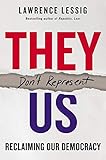They don't represent us : reclaiming our democracy / Lawrence Lessig.
Material type: TextLanguage: English Publisher: New York, NY : Dey Street, an imprint of William Morrow, 2019Description: xv, 334 pages ; 24 cmContent type:
TextLanguage: English Publisher: New York, NY : Dey Street, an imprint of William Morrow, 2019Description: xv, 334 pages ; 24 cmContent type: - text
- unmediated
- volume
- 9780062945716
- 0062945718
- They do not represent us
- Democracy -- United States
- Representative government and representation -- United States
- Political participation -- United States
- Political parties -- United States
- Polarization (Social sciences) -- United States
- Democracia -- Estados Unidos
- Gobierno representativo -- Estados Unidos
- Participación política -- Estados Unidos
- Partidos políticos -- Estados Unidos
- Polarización (Ciencias sociales) -- Estados Unidos
- United States -- Politics and government -- 21st century
- Estados Unidos -- Política y gobierno -- Siglo XXI
- 320.973
- JK 1726 L639t 2019
| Item type | Current library | Home library | Collection | Shelving location | Call number | Copy number | Status | Barcode | |
|---|---|---|---|---|---|---|---|---|---|
 Libro
Libro
|
Biblioteca Juan Bosch | Biblioteca Juan Bosch | Ciencias Sociales | Ciencias Sociales (3er. Piso) | JK 1726 L639t 2019 (Browse shelf(Opens below)) | 1 | Available | 00000163240 |
Includes bibliographical references and index.
Introduction -- Part I. Flaws -- The unrepresentative "them" -- The unrepresentative us -- Part II. Fixes -- Fixing them -- Fixing us -- What "fixed" would get us -- Conclusion -- Afterword.
"In the vein of On Tyranny and How Democracies Die, the bestselling author of Republic, Lost argues that our democracy no longer represents us and shows that reform is both necessary and possible"-- Provided by publisher
"In the vein of On Tyranny and How Democracies Die, the bestselling author of Republic, Lost argues with insight and urgency that our democracy no longer represents us and shows that reform is both necessary and possible. America's democracy is in crisis. Along many dimensions, a single flaw--unrepresentativeness--has detached our government from the people. And as a people, our fractured partisanship and ignorance on critical issues drive our leaders to stake out ever more extreme positions. In They Don't Represent Us, Harvard law professor Lawrence Lessig charts the way in which the fundamental institutions of our democracy, including our media, respond to narrow interests rather than to the needs and wishes of the nation's citizenry. But the blame does not only lie with "them"--Washington's politicians and power brokers, Lessig argues. The problem is also "us." "We the people" are increasingly uninformed about the issues, while ubiquitous political polling exacerbates the problem, reflecting and normalizing our ignorance and feeding it back into the system as representative of our will. A soul-searching and incisive examination of our failing political culture, this nonpartisan call to arms speaks to every citizen, offering a far-reaching platform for reform that could save our democracy and make it work for all of us."--Publisher's description
There are no comments on this title.

